The best in poetry (and poetic things), this week with Seth Haines.
1 Art
What is art? Merriam-Webster defines it as “the conscious use of skill and creative imagination especially in the production of aesthetic objects….” Isn’t that definition subjective by its very terms? After all, what is “the conscious use of skill?” What are the bounds of an “aesthetic” object? And who determines whether a particular work is considered “art”? Is this a determination made by the creator or by the viewer?
Am I complicating the simple? Perhaps. But consider this video posted by The Daily Beast, and ask yourself, “is this really art?”
2 News
This week, the Library of Congress announced that Natasha Trethewey would be given a second term as the United States’ chief poet. Now before you go petitioning your congressman for Poet Laureate term limits, consider this piece at PBS regarding her second term plans to highlight “how poetry lives in communities across the United States….” That’s right, Trethewey will be teaming up with PBS’ Jeffrey Brown to create a series of on-location pieces exploring current American issues “through the framework of poetry….” Sounds interesting, huh? My only question is, how do I cajole Trethewey and Brown to visit Fayetteville, Arkansas?
Speaking of poet laureates, the Poetry Foundation has named Kenn Nesbitt as its next Children’s Poet Laureate: Consultant in Children’s Poetry. Nesbitt, the author of various books of children’s poetry, including The Tighty-Whitey Spider, will assist the Poetry Foundation in raising awareness of children’s “natural receptivity to poetry….” This is a noble task indeed. For more on Nesbitt, check out this article at the Poetry Foundation.
3 Publishing
These days, authors seem to be asking “should I seek traditional publication, or should I go the self-publishing route?” Experts espouse the virtues of both, balance tried-and-true traditional methods with the success stories of self-publishers like Hugh Howey. But what if there were a third way?
According to the Guardian, a group of bestselling authors have come together to create a new model, one that combines facets of traditional publishing with the benefits of self-publishing. Together, these authors has created Notting Hill Press, a “hybrid publishing model that combines the best of traditional and independent publishing.” How does Notting Hill work? You can read more about it in this piece for The Guardian.
4 Poetry at Work
Are you involved in a science or math related field? Are you a doctor, engineer, computer programmer, or research scientist? If so, did you know that the arts can play an important role in your career? According to Susan McConnell, Professor of Biology at Stanford University, the arts assist those in STEM fields (Science, Technology, Engineering, Mathematics) in communicating science and technology to the public, and further foster the health of the whole person (or “whole scientist, ” if you will).
So, scientists, don’t dismiss the poetry. Harness it. Use it. I promise, it will assist you in making sense to those of us who are… well… STEM-challenged.
5 Creativity
To blog or not to blog? That is the question.
Though opinions on the topic vary, I like Erin Feldman’s take: “‘Should I have a blog?’ Yes, but only if the why and the how are addressed first.” For many, blogging can be a creative outlet, a way to practice the craft of writing. On the other hand, some may see blogging as a necessary evil for advancing their business goals. According to Feldman, if you fall in the latter category, reconsider the “why” and the “how” of your blog. What does she mean by the “why” and “how?” You can read more in Feldman’s piece, “Should I Have a Blog, “ and note her creative suggestions for those looking to step away from text-heavy blogging.
Many of us have resolved the blogging question, and maintain our own spaces to practice and hone the craft of creative writing. But what does a blogger do when the well runs dry, when fits of writer’s block hit? Craig McBreen has some suggestions, 35 of them in fact. His suggestions? Read more Pressfield, listen to more meditative music, and don’t miss Louis C.K.’s most recent stand-up routine. Finally, and perhaps most importantly, McBreen says “Just write, as often as you can.”
6 Write-It
During my adolescent years, I wrote a short story about a slew of ghost-frogs (“ghogs”) that resurrected from the dead and haunted a sleepy town in rural Arkansas. The story was my first attempt at satire, and was written during a time when the majority of my friends had become enamored by the horror films of the late 1980s. It was my hope that a bit of literary (but spooky) silliness could distract them from those horrific acts perpetrated by Freddy Krueger on Elm Street.
Alas, it was an idealistic notion at best.
Come to find out, though, I was just a little bit ahead of my time. According to Wendy Maddour, author of Wendy Quill is a Crocodile’s Bottom, “[f]unny is the future.” But for those of you who’ve ever attempted to put their pen to the absurd, satirical, or silly, you know that writing with wit can present challenges. Exactly how do you write sentences that will make your readers scream with laughter? Meddour offers a few of her best tips at The Guardian.
After you read Maddour’s tips, practice your own comedic pieces. Just write it.
7 Poems
This month at Tweetspeak, we’ve been reflecting (pun intended) on the theme, “Mirror, Mirror.” We’ve issued poetic prompts on the theme, and have even compiled our own mirrored musical playlist. What’s more, Every Day Poems has been exploring the theme with its daily offerings of inbox poetry. Last week, I received “Photo of a Girl on a Beach, ” by Carmen Giménez Smith, which reads in part:
Once when I was harmless
and didn’t know any better,
a mirror to the front of me
and an ocean behind,
I lay wedged in the middle of daylight,
paper-doll thin, dreaming,
then I vanished. I gave the day a fingerprint,
then forgot.
I look forward to these daily offerings of poetry from Every Day Poems. Have you signed up to receive them? It’s only $5.99 for an entire year of daily poetry delivered directly to your inbox. Sign up today.
8 People
In this week’s edition of the Top 10 Poetic Picks, we’d like to play a bit of a game called “Creepy or Creative.” The rules are simple. We’ll give you a short scenario and you tell us whether it’s creepy or creative! Are you ready to play?
Miroslav Tichý was an above average artist making his home in a small village in the Czech Republic. Aspiring to become more than a prominent painter for the Communist regime, Tichý turned his attention to photography using homemade cardboard cameras. Creative, right? Perhaps. But Tichý wasn’t your average photographer. No, Tichý used his cameras to snap photographs of the unsuspecting townswomen, many of whom were scantily clad. Creepy, right?
Perhaps it’s a fine line, but either way Tichý’s work has received much critical praise. And to what does he attribute his success? “First of all, ” Tichý said, “you have to have a bad camera”, adding, “[i]f you want to be famous, you must do something more badly than anybody in the entire world.”
If you are a fan of photography and reclusive, oddball artists, don’t miss this piece on Miroslav Tichý (along with some of his more popular images) at Messy Nessy.
Now, you decide. Creepy or creative? Leave your answer in the comments below.
9 Books
My father once claimed that James Fenimore Cooper’s The Last of the Mohicans was the best book ever written in the history of all mankind. Period. Dad seemed like a trustworthy fella growing up, so I took him at his word and checked out a copy at the local library. Within the first two pages, I was lulled to sleep by the often lengthy, overly-descriptive sentences like:
“But emulating the patience and self-denial of the practised native warriors, they learned to overcome every difficulty; and it would seem, that in time, there was no recess of the woods so dark, nor any secret place so lovely, that it might claim exemption from the inroads of those who had pledged their blood to satiate their…”
“Who Cares?!? Wrap up the sentence, already, ” I thought.
I supposed I was alone in my often cynical view of some of the classics. I supposed I was alone, that is, until I stumbled across the website “Love Reading, Hate Books: The classics, reviewed [one star], “ which compiles hilarious one star reviews of classic literature. Regarding A Tale of Two Cities, one reviewer writes, “I had a friend that loved and read and reread all of Charles Dickens novels. I wish I was her, but I am not. I like a story told in clear concise English.” With respect to the work of Edgar Allan Poe, a reviewer notes, “I believe Poe to be an acquired taste, and I have not yet done so.” Finally, and perhaps my personal favorite, one writes of Gone With the Wind, “women are not that slimy and bitchy take my word for it, ” (sic) and then concludes her review with “i will not recommend this book to anyone, not even my enemies, as even they don’t deserve such eternal torture.” (sic)
If you love classic literature, you’ll love this website. But be prepared. Once you start reading the reviews, it’s really hard to stop.
10 Sound n Motion
Do you need a refresher on the Gothic Revival, Postmodern, or the Bauhaus design movements? Look no further than Brain Pickings, who has assembled this collection of educational and witty videos created by Open University. We’ve included the Gothic Revival video in our Top 10 Poetic Picks (it references Lewis Carroll, after all), but make sure to visit Brain Pickings for the complete series.
Photo by Tom (hmm a rosa tint). Creative Commons via Flickr. Article photos by Claire Burge. Used with permission. Post by Seth Haines.
______________________________
Subscribe to our free weekly newsletter.
We’ll make your Saturdays happy with a regular delivery of the best in poetry and poetic things.
Need a little convincing? Enjoy a free sample.
- Become a Better Writer: Fly Fishing Artist Date - June 6, 2014
- No Cat Poetry for Fierce Dog Lovers - November 22, 2013
- Exploring Poetry: Penning a Ghazal - October 18, 2013
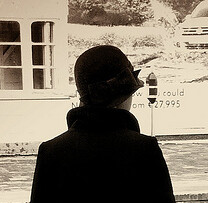
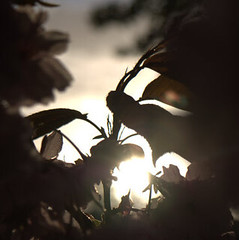


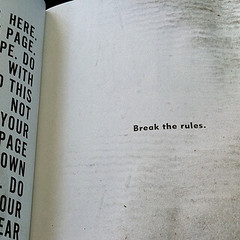
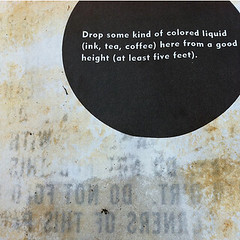




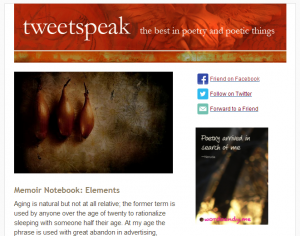
Maureen Doallas says
Great little video from OU.
Erin Feldman says
Thank you for including my post!
I actually started blogging as a way to get back to writing after grad school. It helped me to transition back to writing poetry and more creative pieces, some of which find their way onto the business blog.
Kathryn Neel says
I think you might enjoy this TED talk from the scientists who came up with a program called “Dance Your PhD”. Check it out:
http://www.ted.com/talks/john_bohannon_dance_vs_powerpoint_a_modest_proposal.html
Will Willingham says
Creepy.
Ram Krishna Singh says
Reading the lines Carmen Giménez Smith, I recalled one of my own poems which is not yet published. I would like to share it with the T.S. community:
Being good
couldn’t make me know
any better
I was harmless
they sold my name
and became
what I couldn’t
in the middle of daylight
I vanished like names
from voters’ list
with no difference
to who wins
or who loses
–R.K. Singh